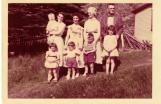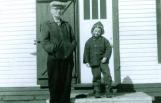1
Diamond Family?
Port Elizabeth, Placentia Bay, Newfoundland, Canada
 Credits:
Credits:Marilyn Collins Pilkington
2
Marilyn Collins Pilkington was born and raised in St. John's and, as such, wasn't subject to resettlement. Her mom grew up on Flat Islands, but left a few years before she got married. Her grandparents did relocate to St. John's when she was eleven; they weren't really resettled, they decided to move in there because all their family was living in town and there really wasn't anything left for them on the island after her grandfather retired from his store.Marilyn's Memories:
I was eleven when my grandparents, Millie and Fred Diamond, moved from Port Elizabeth (or Flat Islands, as we called it) to St. Johnís, where I grew up. It was a few summers before that, though, that I last visited the island while they lived there. It seems that in this interval, between my last visit and their moving to St. Johnís, I had taken to spending my summer vacation with my other set of grandparents, in Notre Dame Bay. Therefore, because most of my memories of Flat Islands were formed before I was eight years old, not all of them are as crisp and clear as I would like them to be. Many of them, in fact, are like a panorama of impressions--sounds and smells and feelings, not always concrete but nevertheless unique to that long-ago time and place.
Once in a while, to recapture those senses, I close my eyes and drift back, and become again that little girl vacationing on Flat Islands:
Weíre coming across the Bay, out from Red Harbour and past the Elephant Head, steaming towards the island. I see my grandparents waiting on the wharf, as the boat draws near. Closer and closer, and I see their smiles and hear their words of welcome as arms reach out to help us out of the boat. All of us are talking at once, as we reach for the luggage and start down the road ďto homeĒ. It isnít far, but far enough for little legs, though soon weíve reached the concrete steps, atop of which sits the gate that opens to the path that leads up the hill to my grandparentsí house. And before I know it, there we are, and everything is the same as it was.
Itís morning now. I hear the rooster crowing as I play on my grandparents' porch. We are half-way up Osmondís hill, and I can see the fog swirl as it envelops the houses below. The adults are talking inside, their voices coming through the door as my grandfather lights the stove and breakfast gets under way. Soon we will all gather in the kitchen and sit down to our meal at the big wooden table. I like that table. It has little drawers on the sides, and my grandmother keeps her cutlery and other things there. We will have fresh eggs, taken from the henhouse that very morning. There will be homemade bread lightly toasted tooóover a real fire, not with an electric toaster, just the way I like it.
My brother and I are playing. We are running across the meadow. Weíre racing to be the first to reach our grandfatherís shop. I feel the wind at my back and, too, a sense of freedom I never know in the city. I am also mindful of the sheep poop that is liberally sprinkling the meadow and am praying as I run that I wonít fall into it.
My grandfatherís shop smells musty and damp, but the smells are comforting too. I see the counter to the right, dry goods to the left, and a big metal scale hanging from the ceiling. My grandfather has heard us coming through the door. He pokes his head out of his back office and comes over to greet us. Then the trap door at the end of the counter is sprung: down we go to the cellar beneath, where bottles of the coldest pop imaginable are waiting just for us. There are chocolate bars and chips too. Everything we could want, and we are welcome to it.
My brother decides to take me down to Uncle Fred Goslingís stage. I can taste the salty air while the stench of gutted fish fills my nostrils. I carefully step across the stage. The planks are widely spaced, and I can see between them to the water below. Fish heads are floating in that water, along with bits of guts and other things I cannot name. My brother is at home on this stage, but I am not. Iím terrified of losing my footing and joining those fish heads. The men are off to one side, gutting their fish and chatting amongst themselves. They are not really paying any heed to us, but they donít seem to mind our being there either. I tell my brother I want to leave.
Sometime lateróa day, a week, a year?--my older sister is taking me for a walk. Sheís taking me to Paddleís Point. Thereís a rickety little rail on the way to Paddleís Point. Iím enchanted by it. Iíve never seen anything like it. Itís a little scary too, having to hold onto that rail, but Iím a big girl now and I rise to the occasion.
Now Iím in my grandmotherís kitchen. Thereís a big wood stove in that kitchen, and a daybed, neither of which we have at home. Thereís also a beautiful bay window, from which you can see all across the harbour. Dickie Gosling has just dropped in to say hi. Iím sitting in my grandmotherís rocking chair, and Iím chatting away to him. Weíre having a great talk, about what I do not know, but itís the feeling of warmth between us thatís important. The next year, when Iím not there, he tells my mother he is disappointed I havenít come, because, he says, I am the only one he can have a really good yarn with. He dies suddenly a few months after that, and I never get to talk with him again.
I have a host of other memories tooósome more fleeting than othersóbut one that will stay with me forever is saying good-bye on the government wharf.
My uncle Ray Clarke has come to fetch us, to take us back to Red Harbour, where the car is waiting to take us home. My grandparents are on the wharf, there to say good-bye, and there are hugs and ďI love youísĒ all around before we get into Uncle Rayís boat. I see them now, almost suspended in time, tiny figures waving goodbye as we push out to sea. It must have been the last time. A feeling comes over me, an inexplicable sadness, a sense that something has passed that I will never know again.
A few years later I overheard my mother talking to a neighbour about resettlement. She said then that the young people would be going anyway, but it was the older people she felt sorry for. The island, she said, was the only home most of them had ever known, and they would miss it dearly. She felt it wasnít right to make them leave at that point in their lives.
I shared her sentiments. I couldnít believe that people were being asked to leave their homes and that whole communities would cease to exist. Nothing seemed right about it.
Itís been many decades now since resettlement has taken place. The old people have passed on, new communities have taken root. The world has changed, and we must all move with it. But oh to go back, if only for a moment, and find everything again as we once knew it.
3
Millie & Fred DiamondPort Elizabeth, Placentia Bay, Newfoundland, Canada
 Credits:
Credits:Marilyn Collins Pilkington
5
Making Hay?
Port Elizabeth, Placentia Bay, Newfoundland, Canada
 Credits:
Credits:Marilyn Collins Pilkington
6
In the Garden?
Port Elizabeth, Placentia Bay, Newfoundland, Canada
 Credits:
Credits:Marilyn Collins Pilkington
7
Diamond's StorePort Elizabeth, Placentia Bay, Newfoundland, Canada
 Credits:
Credits:Marilyn Collins Pilkington
8
Diamond Family Home?
Port Elizabeth, Placentia Bay, Newfoundland, Canada
 Credits:
Credits:Marilyn Collins Pilkington
